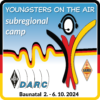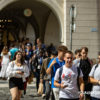The first Train the Trainer reports were submitted 2 months after the YOTA camp in South Africa
ended. The reports give an interesting insight into the youth work going on in a number of countries
in IARU Region 1.
Many teams presented their experiences and the things they learnt at YOTA 2018 to their societies
and the public sparking interest in youngsters who want to attend the 2019 YOTA event and
gaining more support for youth work from national societies and local clubs alike.
A number of teams mentioned that a very important aspect of youth work is keeping youngsters
connected, for example through social media groups, regular meetings and the like. This makes it
easier to introduce a new youngster into a fun environment, even if there are no events or activities
going on at the moment. Furthermore the possibility to practice the hobby with other young people
keeps the interest of youngsters so that they continue to practice amateur radio.
In Germany, there is a situation which is somewhat different to other countries. The DARC has a
large number of young members, around 1200 between the ages of 10 and 26, about half of which
are licensed. The problem for the German youth team is therefore not to get new youngsters
interested in the hobby but to build up a network of existing youngsters. Even though the number is
very high, very few of these youngsters know each other and even less have the chance to
participate in youth activities together. A network of active youngsters who do things together is
essential to keep youngsters (existing and new) interested. Especially those who were introduced
to the hobby by their parents have to be shown that there is another side to the hobby.
Strengthening youth groups within amateur radio societies is also part of the strategy of the
Austrian team which faces a similar situation.
The Czech team mentioned in their report that at youth events, they combine the amateur radio
activities with other fun activities to make the event more engaging, for example including camp
fires, hiking and more alongside the radio activities. The idea behind this is that youngsters who
are new to the hobby will associate amateur radio with the fun they had with other youngsters
during these activities, instead of only associating it with the radio aspect. This works particularly
well with younger children who are not yet as technically interested and so can not be hooked by
the technical aspect alone.
Another group of youngsters which many youth teams target are university students, especially
those in technical courses as they have a pre-existing interest for technology and experimenting.
The Ethiopian team is an example of this as most of their members are engineering students. The
Ethiopian team’s strategy is to engage more students in amateur radio through courses and
workshops offered at universities, for example kit building. The aim is for new youngsters to set up
clubs of their own in different universities and schools to spread the hobby across the country.
The Finnish team pointed out the importance of working internationally, for example coordinating
with neighbouring countries to organise youth events such as the sub regional Nordics On The Air
camp held in Sweden. Furthermore the Finnish team met with the Swedish youth team to
exchange ideas and make plans together. This is exactly the idea behind Train the Trainer, to
encourage the exchange of ideas, experiences and plans for the future, just that Train the Trainer
allows this to happen all across Region 1, not just neighbouring countries.
Another factor which can not be ignored is the importance of face to face contacts, whilst social
media work very well, relationships only formed online are not as strong as those formed, or
strengthened in person. This is especially important for the youth team. A team which knows each
other in person will be much more dedicated and work together more effectively than one which
has only met online.
An important point mentioned by the German team is that it is extremely helpful to cooperate and
coordinate with the national and local societies. For example, the youth coordinators can provide
support by helping to find existing youngsters, sharing their experience, giving advice and much
more.
A number of countries mentioned the upcoming JOTA event as part of their short term plan, special
reports about this event will be posted on the website as well. It will be interesting to see how
different countries organise the event and how youngsters respond to the activities.
73 de Monty Schebesta, OE3VVU





